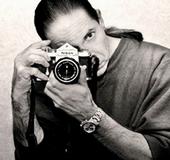On December 16, 2006, Gene Martin passed away at the age of 55 while out on a shoot.
It could be said the Gene died doing what he loved and was best-known for. I can assure you he could have died no other way. Gene never left his camera at home, and the idea of artistic photographic composition never left his thoughts.
As I assemble my own thoughts in an attempt to write something meaningful about Gene, it occurs to me that writing a story takes more than keen observation and writing skills. It is the composition - the piecing together of what has been observed combined with one's personal experience that makes it literature.
Gene was a keen observer and a recognized master of photographic technique. But, like a great writer, he was really a composer of art.
I like to think of romance as a concept of pureness when the world is in its best possible light. A master of light and angles, Gene brought out the romance in music, people, and urban and natural landscapes, by composing right on the spot.
I had the unique pleasure of watching Gene work on a few occasions. But thanks to Gene's passionate and detailed storytelling, known by all his friends, I felt like I had been there many more times.
I will never forget his story about driving Dizzy Gillespie to his shoot in New Jersey. In the car, Dizzy was playing with the toy trumpet prop Gene bought him, repeating "The Boss! The Boss!" Gene was baffled as to why he kept saying this, until he realized they just driven past the home of Bruce Springsteen.
Gene's stories ran the gamut, from a multi-million dollar Bat Mizvah that featured performances by Aerosmith, Tom Petty, and Stevie Nicks, to blending into a parade that was part of legendary drummer Elvin Jones' New Orleans-style funeral - to the somber scene he captured at Ground Zero as people came to post information about their missing family and friends.
A musician and an undeniable genius in capturing musicians on film, Gene painted these moments much the same way that music paints emotion. With one image, and often on the first try, Gene made you feel not only like you were there, but that you understood what being there was like.
I will never forget the look on drummer Dave Weckl's face when, after technical problems had delayed the shoot considerably, Gene showed Dave the first photo and Dave grinned. It had been more than worth the wait.
Likewise, I saw that same respect from my own band when Gene drove us around New York city for a shoot. He knew every little corner of the city and treated us like rock stars all the way.
This brings me back to the quality that makes the artist and, in this case, that made the man: the human quality.
You could talk to Gene and he would listen. You could listen to Gene and learn something. You were guaranteed to laugh hard in either case, and everything you got was real.
People like Gene make you hope there is a heaven, and that you might someday get there. My idea of heaven is that it is something - maybe the only thing - that humans can't understand, describe, or control.
But if heaven does exist, I know Gene is there capturing it in the perfect light, and that it is a composition we would all want to see.
- Steven Orkin
January, 2007
